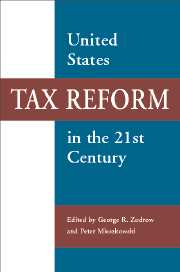Book contents
- Frontmatter
- Contents
- List of Contributors
- Preface
- 1 Introduction: The Fundamental Question in Fundamental Tax Reform
- 2 Behavioral Responses to a Consumption Tax
- 3 The Economic Impact of Fundamental Tax Reform
- 4 Capital Income Taxation in Tax Reform: Implications for Analysis of Distribution and Efficiency
- 5 International Aspects of Fundamental Tax Reform
- 6 Distributive Analysis of Fundamental Tax Reform
- 7 The Role of Administrative Issues in Tax Reform: Simplicity, Compliance, and Administration
- 8 Evaluating the National Retail Sales Tax from a VAT Perspective
- 9 Transitional Issues in the Implementation of a Flat Tax or a National Retail Sales Tax
- 10 Historical and Contemporary Debate on Consumption Taxes
- 11 The Politics and Ideology of Fundamental Tax Reform
- Bibliography
- Index
5 - International Aspects of Fundamental Tax Reform
Published online by Cambridge University Press: 23 October 2009
- Frontmatter
- Contents
- List of Contributors
- Preface
- 1 Introduction: The Fundamental Question in Fundamental Tax Reform
- 2 Behavioral Responses to a Consumption Tax
- 3 The Economic Impact of Fundamental Tax Reform
- 4 Capital Income Taxation in Tax Reform: Implications for Analysis of Distribution and Efficiency
- 5 International Aspects of Fundamental Tax Reform
- 6 Distributive Analysis of Fundamental Tax Reform
- 7 The Role of Administrative Issues in Tax Reform: Simplicity, Compliance, and Administration
- 8 Evaluating the National Retail Sales Tax from a VAT Perspective
- 9 Transitional Issues in the Implementation of a Flat Tax or a National Retail Sales Tax
- 10 Historical and Contemporary Debate on Consumption Taxes
- 11 The Politics and Ideology of Fundamental Tax Reform
- Bibliography
- Index
Summary
Proposals for fundamental tax reform have attracted considerable attention in recent years. Most of the discussion has focused on domestic problems of administration and compliance, or on the effects of tax reforms on labor supply and capital accumulation within the domestic economy. International issues have been given relatively little attention. As the world economy becomes increasingly integrated, however, a focus on international issues becomes increasingly appropriate.
This chapter has two closely related objectives: to survey the potential effects of fundamental tax reform in the United States on the international economy, and to assess the ways in which estimates of the economic effects of fundamental tax reform would be altered as a result of changes in the economic modeling of the foreign sector. International capital flows will be given particular attention.
A description of the current tax treatment of foreign-source income opens the chapter. I also describe how these tax rules would be changed and how administrative and compliance issues would be affected if fundamental tax reform were enacted. Next I survey the evidence on the international mobility of capital as it relates to fundamental tax reform and show how our understanding of the incidence of the corporate tax can change when we consider international flows of goods and capital. Then I evaluate recent attempts to assess the efficiency gains from fundamental tax reform, both in models of closed economies and open economies.
- Type
- Chapter
- Information
- United States Tax Reform in the 21st Century , pp. 109 - 139Publisher: Cambridge University PressPrint publication year: 2002
- 2
- Cited by



